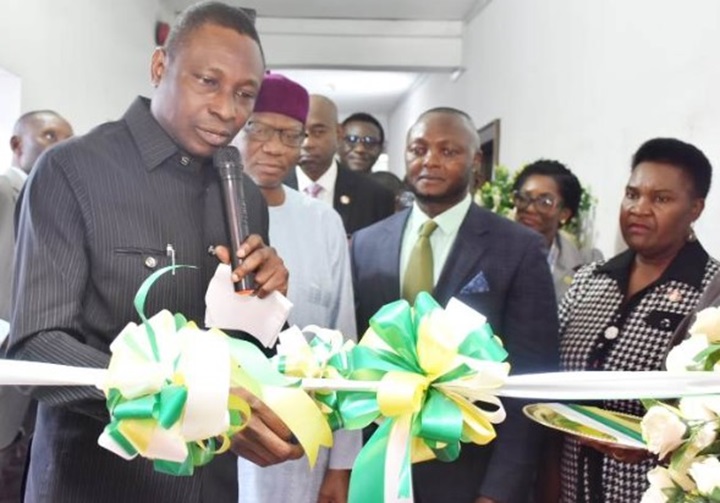In a strategic move to enhance its workforce’s capabilities and promote digital learning, the Economic and Financial Crimes Commission (EFCC) has launched a state-of-the-art electronic learning management studio at its Academy in Karu, Abuja.
This initiative marks a significant step in advancing the fight against financial crimes through technology-driven education.
The studio was officially commissioned on Wednesday, 21st August 2024, after the 6th Annual General Meeting of the Network of National Anti-Corruption Institutions of West Africa (NACIWA). The event attracted a distinguished group of anti-corruption experts from across West Africa, reinforcing regional cooperation in the fight against corruption.
During the launch, EFCC Executive Chairman and President of NACIWA, Mr. Ola Olukoyede, underscored the importance of using technology to strengthen the agency’s anti-corruption efforts. He noted that the e-learning studio would be a game-changer for the EFCC, enabling officers to stay ahead of criminals who are increasingly using sophisticated methods to move money across borders.

“Our mandate is now technology-driven,” Olukoyede explained. “In the past, transactions were cumbersome, but today, with the click of a button, money moves across the globe. As financial crimes evolve, we must also advance in the way we monitor and prevent them. The launch of this e-learning studio is a testament to our commitment to staying ahead of the curve.”
The EFCC Academy’s Commandant, Mrs Chinwe Ndubeze, highlighted the studio’s role in enhancing capacity-building efforts not just for EFCC staff but for other law enforcement agencies in Nigeria and the wider West African region. As the designated training hub for NACIWA, the academy’s adoption of digital learning tools represents a forward-thinking approach to training in the modern era.
“The launch of our E-Learning System demonstrates that both the EFCC and NACIWA are adapting to the digital age. We are proud to be leading the way in transforming training from traditional methods to innovative, digital platforms,” Ndubeze said. “E-learning is more inclusive and accessible, ensuring that education can continue regardless of physical location.”
Aliyu Abubakar Wali, Head of the EFCC’s External Cooperation Unit, expressed excitement about the potential of the new studio to revolutionise learning for EFCC staff, sister agencies, and stakeholders. He emphasised that the platform would provide endless opportunities for professional growth, enabling officers to enhance their skills and uphold the highest standards of integrity and professionalism.
“This studio is not just a facility—it’s a gateway to boundless opportunities for growth, learning, and innovation. It will play a pivotal role in equipping our officers with the tools they need to excel in their duties and drive the anti-corruption agenda forward,” Wali said.
He also highlighted the collaborative origins of the studio, noting that the idea for the project was conceived during the COVID-19 pandemic. In partnership with the Legal Defense and Assistance Project (LEDAP), the EFCC developed the platform to ensure that learning and professional development could continue uninterrupted, even during global crises.
LEDAP National Coordinator, Chino Obiagwu, SAN, commended the EFCC on the successful completion of the project, describing the e-learning studio as a modern, IT-driven system that allows individuals to learn from anywhere, be it at home, office, or on the go. Obiagwu praised the project for its potential to deliver knowledge in a flexible and accessible manner, making it a valuable tool for anti-corruption efforts.
The commissioning event was attended by representatives from various esteemed organisations, including the Independent Corrupt Practices and Other Related Offences Commission (ICPC), MacArthur Foundation, ECOWAS, and the United States Agency for International Development (USAID). This high-profile gathering underscored the significance of the studio and the broader commitment to leveraging technology in the fight against corruption.
Following the launch, guests were taken on a tour of the property recently donated to NACIWA by President Bola Ahmed Tinubu, further symbolising the Nigerian government’s support for regional anti-corruption efforts.
The launch of the EFCC’s e-learning studio represents a bold step towards a more transparent and accountable future for Nigeria and West Africa. By harnessing the power of technology, the EFCC is not only enhancing its capacity to tackle economic and financial crimes but also setting a new standard for anti-corruption training in the region.
As the EFCC continues to explore new opportunities for collaboration and innovation, the e-learning studio is poised to become a central pillar in the organisation’s efforts to promote good governance and integrity across West Africa. This initiative is a clear signal that the fight against corruption is evolving—and that the EFCC is leading the charge into a new digital era.
Support InfoStride News' Credible Journalism: Only credible journalism can guarantee a fair, accountable and transparent society, including democracy and government. It involves a lot of efforts and money. We need your support. Click here to Donate
